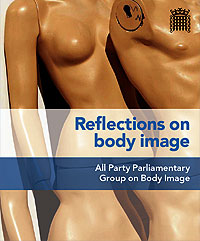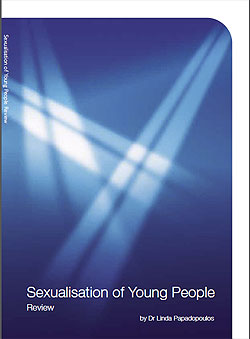Report Into Body Image Problems Now Published Some Two Years After Study On Sexualisation Of Children
 As mentioned by Derek Maylor in his June Chairperson’s Message, an All Party Parliamentary Group report into body image published on 30th May, says that girls as young as five now worry about how they look. Whilst many of us understand that many media images of celebrities are unrealistic there obviously is a definite problem with body image for very young people and this will have serious consequences in the years to come.
As mentioned by Derek Maylor in his June Chairperson’s Message, an All Party Parliamentary Group report into body image published on 30th May, says that girls as young as five now worry about how they look. Whilst many of us understand that many media images of celebrities are unrealistic there obviously is a definite problem with body image for very young people and this will have serious consequences in the years to come.
The report entitled Reflections On Body Image also says that appearance is the greatest cause of bullying in schools which is nothing new on its own, however I have not heard statistics such as around half school girls and up to a third of boys have dieted to lose weight and that 1.6 million people in the UK have eating disorders.
The inquiry - which heard from academics, magazine editors, company chief executives, the public, and other experts - also heard that:
- Wiping out dieting could stop 70% of eating disorders
- More than 95% of people on diets regain the weight they lose
- 1.6 million people in the UK have eating disorders
- Up to one in five cosmetic surgery patients could suffer from body dysmorphic disorder
- One in three men would sacrifice a year of life to achieve their ideal body
- One in five people have been victimised because of their weight
 In the executive summary, Liberal Democrat MP and Chair of the APPG on Body Image, Jo Swinson says:
In the executive summary, Liberal Democrat MP and Chair of the APPG on Body Image, Jo Swinson says:
“Body image dissatisfaction in the UK has never been higher, particularly among young people. The pressure to conform to the impossible body “ideals” we are bombarded with in advertising, magazines and on the catwalk is overwhelming and damaging.
Low self-esteem, depression and eating disorders are all increasing, along with unhealthy behaviour and thoughts: girls as young as five now worry about their size and appearance, and 38 per cent of men say they would give up a year of their life for the perfect body.”
The evidence gathered by the all party parliamentary group, leads to a number of clear conclusions according to the executive summary of the report:
• Media, advertising and celebrity culture were perceived by almost 75% of respondents to the consultation to be the main social influences on body image.
• The appearance ideals portrayed by visual media and advertising were seen to be at odds with the general population or the majority of consumers and it was estimated that fewer than 5% of the population could ever realistically attain the body ideals presented.
• Media criticism of body weight, size or appearance together with a perceived lack of body diversity and over-reliance on image manipulation was seen to contribute to body image dissatisfaction.
But perhaps one of the amazing statements in the report’s list of findings, given the total inaction by the media bodies concerned; is this statement:
• Representatives from advertising and media said there was a genuine desire to use more diverse, relatable and authentic imagery.
Many commentators believe this statement cannot be taken at face value and merely shows the naivety and complacency of those MPs actually believing it.
In a Twitter exchange between Jo Swinson chairperson of the APPG, and website editor Chris Ingram she rejected any idea of legislation in response to the findings of the report, clearly following the Tory government policy of requesting volunteerism from businesses and industries; instead of making legislation.
However, this is not the first time such a study has been commissioned by the Government, for them only to ignore any recommendations. Some 2 years ago in 2010 a report into the sexualisation of children, came to far more in-depth conclusions.
The recommendations included mandatory work on body image in schools, setting up a national body to monitor and take action on body images considered to be harmful and unattainable in advertising, and local authority vetting of outdoor advertising.
Where this new report differs is that it attempts, (but fails) to address the issue of body modification through cosmetic surgery in that it recommends:
- Proposed tightening of regulations for cosmetic surgery and supplements advertising
- Mandatory screening of patients undergoing cosmetic surgery
- Research to assess the long term impact of cosmetic surgery on patients
- Establish a patient group to provide support on cosmetic and body enhancements
But nowhere does it talk about the regulation of, and licensing of cosmetic surgeons and the clinics and services being promoted on the high street, in magazines and on TV and radio commercials!
For a 78 page report, the recommendations listing of just 23 recommendations in 3 categories, no timescales or strategy, is purely a ‘cosmetic’ exercise resulting in a toothless pile of rhetoric!
As stated above, this report is in a long line of report which is full of good intentions, but without legislation nothing will change.
 Back in February 2010, leading child psychiatrist, Dr Linda Papadopoulos produced a report for the then Labour government on the sexualisation of young people in our society.
Back in February 2010, leading child psychiatrist, Dr Linda Papadopoulos produced a report for the then Labour government on the sexualisation of young people in our society.
In her executive summary, Dr Papadopoulos explains:
“Although the original intention of the review was to focus on how sexualisation is affecting girls, it quickly became evident that we could not talk about girls without acknowledging the concomitant impact on boys and the hyper-masculinised images and messages that surround them.
This is not an opinion piece, the evidence and arguments presented within this document are not based on conjecture but on empirical data from peer reviewed journals, and evidence from professionals and clinicians.
Behind the social commentary and the headlines about inappropriate clothing and games for children, there are the real statistics, on teenage partner violence, sexual bullying and abuse that need to be acknowledged and addressed.”
She adds:
“I want my little girl, indeed, all girls and boys, to grow up confident about who
they are and about finding and expressing their individuality and sexuality, but not through imposed gender stereotypes or in a way that objectifies the body or commodifies their burgeoning sexuality.”
Her report recommended exactly what the most recent report does, in stating that we need to start with the education of young people in schools:
“The Department for Children, Schools and Families (DCSF) to issue statutory guidance to schools to promote a ‘whole school’ approach to tackling gender inequality, sexual and sexist bullying and violence against women and girls.”
Currently, sexualisation and sexual bullying via the use of mobile phones is so widespread amongst children that it has become part of the culture within our schools! But some of the reports recommendations are far reaching and innovative, and address the problems head on in the ‘real world’:
In a section specifically aimed at the media, the report recommends:
18) A working group of high profile women in media together with academics
should be set up to monitor and address gender inequality in the media.
19) The establishment of a media award that promotes diverse, aspirational and non-sexualised portrayals of young people.
 It goes further still in addressing publicity and advertising in our communities such as the one below:
It goes further still in addressing publicity and advertising in our communities such as the one below:
24) The content of outdoor advertisements to be vetted by local authorities as part of their gender equality duty to ensure that images and messages are not offensive on the grounds of gender.
25) Broadcasters are required to ensure that music videos featuring sexual posing or sexually suggestive lyrics are broadcast only after the ‘watershed.’
26) The current gap in the regulatory protection provided by the VideoRecordings Act 1984 to be closed by removing the general exemption for‘works concerned with music’.
31) The existing voluntary code for retailers regarding the placements of ‘lads’ mags’ should be replaced by a mandatory code. ‘Lads’ mags’ should be clearly marked as recommended for sale only to persons aged 15 and over.
Two years on from that report absolutely zero has been done to address any of the issues or implement any of the recommendations inherent in Dr Linda Papadopoulos’ report!
There is no better ending to this news item than to quote Dr Papadopoulos’ own words from the conclusions of her report in 2010:
“Sexualisation is a profoundly important issue that impacts individuals, families and society as a whole.
Unless sexualisation is accepted as harmful, in line with the evidence presented in this report, and similar reports from the US and Australia, we will miss an important opportunity here:
* an opportunity to broaden young people’s beliefs about where their value lies;
* to think about strategies for guiding children around sexualisation and objectification;
*
and to create new tools and spaces for young people to develop and explore their sexuality in their own time and in their own way.”
Both reports can be downloaded from the E-Library database here by choosing category 'Equal Opportunities'
Source: Unionsafety



 In the executive summary, Liberal Democrat MP and Chair of the APPG on Body Image, Jo Swinson says:
In the executive summary, Liberal Democrat MP and Chair of the APPG on Body Image, Jo Swinson says: Back in February 2010, leading child psychiatrist, Dr Linda Papadopoulos produced a report for the then Labour government on the sexualisation of young people in our society.
Back in February 2010, leading child psychiatrist, Dr Linda Papadopoulos produced a report for the then Labour government on the sexualisation of young people in our society.